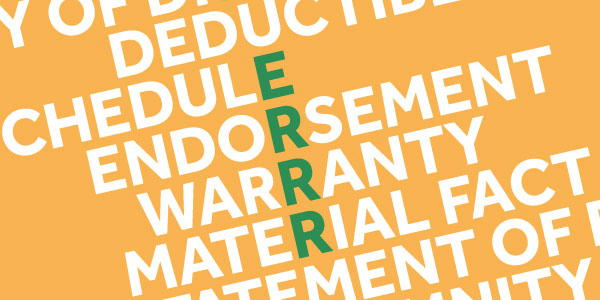
Having, with some success, already explained what some of the jargon means, it's time we tackled another chunk of confusing insurance terminology.
We'll look at the names of some of your policy documents first. Then we'll decipher a few of the important words you'll find lurking within.
Brace yourself...
Confusing insurance terminology explained
Schedule
A document containing information specific to you and your policy. It details your policy number, your business's details, the cover you've bought, how much you're paying, when your cover runs from/to, and the subsections of cover included within each type of insurance you have. It's all about you, really.
Endorsement
Contains the same information as a schedule and is issued if you change something about your insurance mid-term, before your renewal's due. It notes what's changed and sits alongside the rest of your documents.
Duty of disclosure
This shows (some of) the information about your business your insurer needs to calculate how much to charge you. Broadly, it notes your turnover and payroll figures at the time you bought insurance, as well as things like the industry you work in.
It's a good idea – and a condition of your policy – to keep an eye on these figures and to keep your insurer updated throughout the year. A significant revenue increase, for example, could mean you're suddenly underinsured without knowing it.
Statement of fact
An important one, this. It's a list of statements confirming the things your business does and doesn't do. Your insurer's decision to cover you, under what specific terms, is based on this information.
If it turns out you do something when your statement of fact says you don't, and there's a claim, your insurer has every right not to cover it. Better make sure it's right, then.
Indemnity
The basic principle of insurance. If you suffer a loss, it's your insurer's job to make sure you're not out of pocket. In reality, this means paying you money or replacing an item.
The idea is you're returned to the same financial position you were in before the loss/claim happened.
Warranty
A very strict condition in your policy, set by your insurer. It's not to be ignored. Breaching it means your insurer has the right to chuck out your claim, no questions asked.
Material fact
Anything that influences the insurer's decision to cover you, under what clauses/exclusions/warranties/terms and conditions, and for how much, is a material fact.
You're expected to 'disclose all material facts' when you get your insurance. If you're not sure what constitutes a material fact, you could do worse than tell your insurer everything about you and your business. They don't like surprises, after all
Deductible
More commonly called an 'excess', it's the part of a claim you pay. Fairly obviously, the amount of money involved in a loss must be higher than the excess for your insurer to cover it.
All clear?
OK, that'll do for now. There's only so much dull insurance terminology a person can take. Although it's important, of course, to understand it - and what you're signing up for.
For more help, check out our handy insurance glossary. Or feel free to get in touch if there's something else you'd like explained. Just call us on 0345 222 5391.
Image used under license from Shutterstock.
insurance explained
